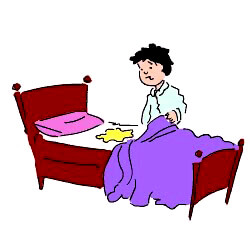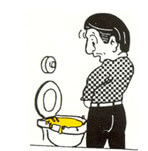
Ayurvedic Doctor for Polyuria Treatment in Kolkata
(i) cystitis-inflammation of the bladder; The main symptoms of dysuria are:(i) Scanty urine Ayurvedic Treatment for Dysuria includes prescribing of Shilajit. Pas Physicians of Ayusya clinic give direction to the patients with other unique formulation medicines for combating the pain during urination or burning micturation. A patient suffering from dysuria (of whatever origin) must desist from eating beans and pulses. Green vegetables like spinach, tomatoes and ladyfingers should also be avoided. The intake of liquids, particularly water, must be increased. Liquor and acid-forming foods, condiments, chillies etc, should not be taken. |
Nocturnal Polyuria |
 Nocturnal polyuria literally means that you wake up at night (nocturnal) several times (poly) because you have to urinate ("uria"). Nocturnal polyuria literally means that you wake up at night (nocturnal) several times (poly) because you have to urinate ("uria").Nocturnal polyuria occurs in both men and women. It becomes more common as people age. Nocturnal polyuria is caused by the following:
|
Contact us!
We are happy to help you..
Book Appointment
- Ultadanga Book appointment
- Gariahat Book appointment
- Howrah Book appointment

Subscribe to our Newsletter
Book Appointment
-
Ultadanga
 (0)9831775590
Book appointment
(0)9831775590
Book appointment
-
Gariahat
 (0)9831775590
Book appointment
(0)9831775590
Book appointment
-
Howrah
 (0)9831775590
Book appointment
(0)9831775590
Book appointment
Call
-
Ultadanga
 (0)9831775590
(0)9831775590
-
Gariahat
 (0)9831775590
(0)9831775590
-
Howrah
 (0)9831775590
(0)9831775590



 Dysuria means difficulty or pain in the process of expelling urine. The amount of urine may be reduced, it may be expelled painfully or it may be ejected in small quantities each time, the sufferer left with the urge to void his bladder all the time. The three main causes of dysuria are:
Dysuria means difficulty or pain in the process of expelling urine. The amount of urine may be reduced, it may be expelled painfully or it may be ejected in small quantities each time, the sufferer left with the urge to void his bladder all the time. The three main causes of dysuria are: